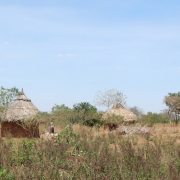A visit to Kumi Hospital in north east Uganda.
Ewan and I first came to Kumi Hospital in 2018. We met Amuron, then a general registered nurse. This year she graduated as a psychiatric clinical officer, having been sponsored by Jamie’s Fund, and is taking the lead in the development of mental health services in Kumi Hospital. Having been impressed by Amuron’s lovely warm personality, intelligence and care for people with mental illness, we are thrilled to have witnessed this career progression.
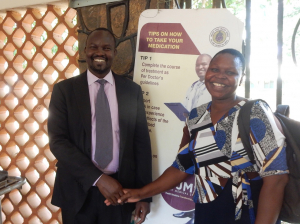
Kumi Hospital was originally for leprosy patients and is a spacious and serene setting – that suits our patients with acute mental illness too. The medical director is new, and is building a good team, supporting Amuron in all the possibilities for the future.
It is in a poor area. Most people are subsistence farmers. The soil looks poor and bare rock is visible in some places. The main crops are the more drought-resistant ones – millet, sorghum (a kind of millet) and cassava. Most of the houses are of sun dried mud brick, rather than the more durable and more expensive fired brick and most have thatched roofs rather than the corrugated iron we commented on before
We had a morning meeting, with what we thought was an early lunch part way through: bread, boiled egg, mandazi (Ugandan doughnut, sort-of), and banana. Great work in the meeting, reviewing Amuron’s annual report and considering her project proposal for what next.
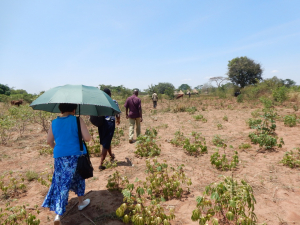
The team then invited us to join them on a home visit. Oh yes please!
Our vehicle took us with Amuron and her colleague out to a rural area, dry and brown, awaiting the rains. The vehicle stopped under a tree, and a relative of the lady concerned led us on a long walk through the cassava fields under the midday sun. Brought back so many memories of similar expeditions in earlier times.
You learn so much on such a visit. We were sitting amidst a ring of thatched houses, the lady herself there, with the husband across the circle, while a whole group of neighbours and assorted children sat in a ring on the dusty ground preparing the cassava tubers in the centre.
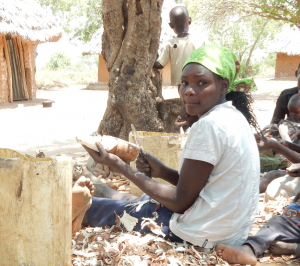
The clinical consultation continued, and no one took the slightest heed to issues of confidentiality. That doesn’t take a priority as it does in the west. You need your family, neighbours and friends to support you, and they might as well hear what is being said so they are properly genned up. All very interesting indeed.
Then, would we mind seeing another patient? A similar trek, to find that this patient had taken off to avoid us and didn’t look like she was coming back any time soon. So we talked to the family and concerned friends while we could.
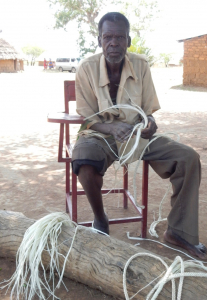
Finally, perhaps just one more? Off we went again across the fields. This was a man of 40 or so, at home with his parents, and depressed for a long time. We were able to discuss possible changes of meds, and identified some psychosocial dynamics that might benefit from discussion.
There is something very special about seeing patients at home.
As we got back, lunch appeared, the full whack with rice, Irish potatoes (called thus since our Malawi days long ago), beef stew, veggie casseroles and water melon. Oh! That earlier little confection must have been breakfast!
Maureen Wilkinson.

